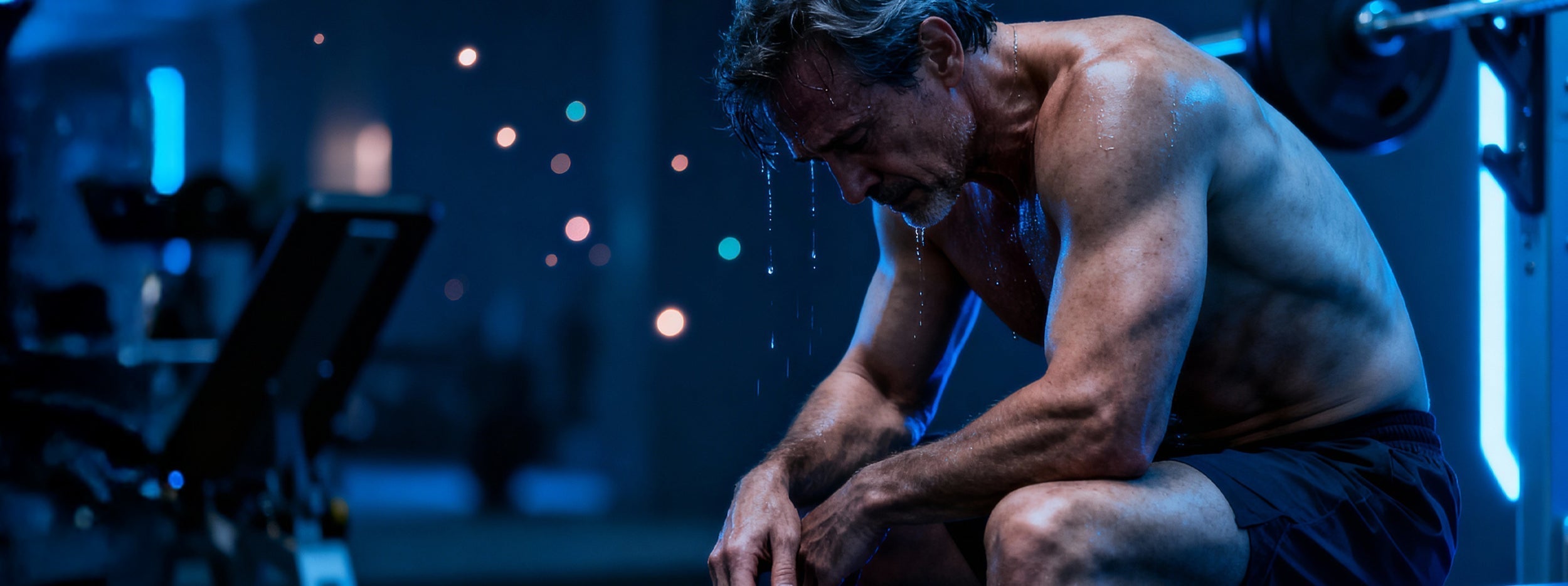This is why your energy sucks...

If you feel like you’re dragging more than ever—even though your life hasn’t changed much—you’re not imagining it. Work, family, responsibilities may look the same, but your body isn’t. As men age, the very hormones that drive energy, focus, and recovery steadily decline. And the result? Feeling like you're running on less than before.
Hormones and Energy: What’s Really Happening
Hormones like growth hormone (GH) and testosterone don’t just impact muscle—they directly affect energy, sleep, and recovery. * Studies suggest that hormonal changes with age can influence how men sleep [5]. Decade by decade, it may feel harder to reach the deep, restorative rest your body once got with ease.
Pair this with lifestyle stressors—like sitting too much [1], carrying extra weight [2], or chronically elevated cortisol from stress [3]—and you’ve got a perfect storm for fatigue. Even if nothing in your daily routine has changed, your biology has. Hormonal decline is silently pulling the rug out from under your energy reserves. *
What It Looks Like Over Time
Think about it: in your 20s, you could push through long days, late nights, and still bounce back. By your 30s and 40s, the crash feels heavier, and the recovery takes longer. With each decade, men often notice changes in both the duration and depth of their sleep—and research points to shifting hormones as a factor [5]. * Add in reduced mitochondrial function—the powerhouses of your cells—and you’re left feeling like your energy tank leaks faster than you can fill it [4]. *
This is why so many guys over 35 complain about “mystery fatigue.” It’s not weakness. It’s not laziness. It’s physiology. *
What You Can Do About It
You can’t stop the clock, but you can fight back. Three smart moves to tackle low energy:
-
Prioritize quality sleep. Protect it like it’s non-negotiable. Screen curfews, darker rooms, and consistent routines all help.
-
Move more—even if it’s light. Breaking up sedentary time boosts circulation, metabolism, and energy [1]. *
-
Support healthy hormonal activity. Lifestyle changes matter, but they can take time. That’s where a strategic stop-gap comes in. *
BioPro+® is designed with this exact reality in mind—providing targeted nutritional support for men who want to stay sharp, resilient, and energized without the hassle of needles or prescriptions. It doesn’t replace healthy habits, but it bridges the gap when your body isn’t keeping pace. *
The Hard Truth
If you feel more tired now than you did ten years ago, it’s not in your head—it’s in your biology. * Feeling less energized isn’t just in your head—hormonal shifts naturally happen as you get older. * The sooner you recognize what’s happening, the faster you can get ahead of it.
*These statements have not been evaluated by the Food and Drug Administration. This product is not intended to diagnose, treat, cure, or prevent any disease.
Works Cited
-
Park, Jung Ha et al. “Sedentary Lifestyle: Overview of Updated Evidence of Potential Health Risks.” Korean Journal of Family Medicine, vol. 41,6 (2020): 365–373. doi:10.4082/kjfm.20.0165.
-
Ahmed, Sirwan & Mohammed, Ribwar. “Obesity: Prevalence, causes, consequences, management, preventive strategies and future research directions.” Metabolism Open, vol. 27, 2025, 100375. doi:10.1016/j.metop.2025.100375.
-
Singh, Balvinder & Maurya, Neelesh. “The Cortisol Connection: Weight Gain and Stress Hormones.” Archives of Pharmacy and Pharmaceutical Sciences, vol. 8, 2024. doi:10.29328/journal.apps.1001050.
-
Surapaneni, Dinesh Kumar et al. “Shilajit attenuates behavioral symptoms of chronic fatigue syndrome by modulating the hypothalamic-pituitary-adrenal axis and mitochondrial bioenergetics in rats.” Journal of Ethnopharmacology, vol. 143,1 (2012): 91–9. doi:10.1016/j.jep.2012.06.002.
-
Frontiers in Physiology. “Aging and Sleep: How Hormonal Decline Impacts Restorative Cycles.” 2025. https://www.frontiersin.org/journals/physiology/articles/10.3389/fphys.2025.1544286/full




